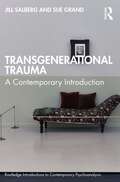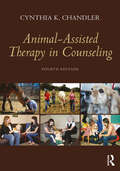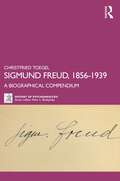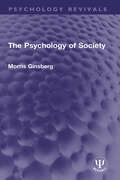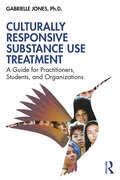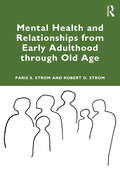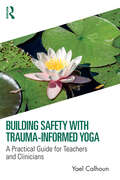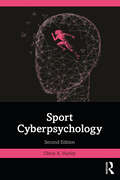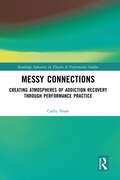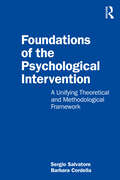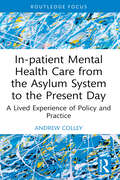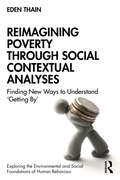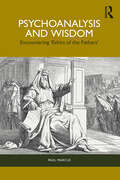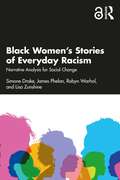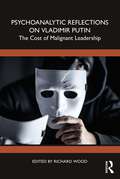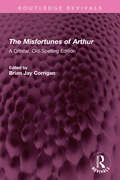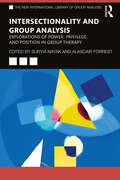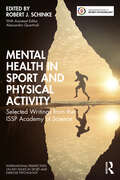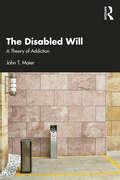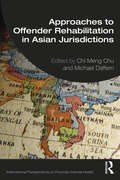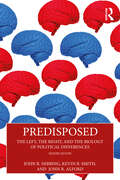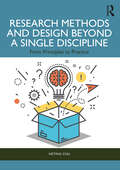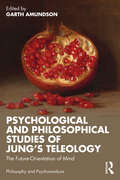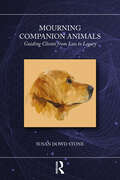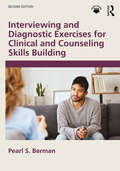- Table View
- List View
Transgenerational Trauma: A Contemporary Introduction (Routledge Introductions to Contemporary Psychoanalysis)
by Jill Salberg Sue GrandIn this book, Jill Salberg and Sue Grand offer an overview of the psychoanalytic work on transgenerational trauma, rooting their perspective in attachment theory, and the social-ethical turn of Relational psychoanalysis.Transgenerational Trauma: A Contemporary Introduction is a cutting-edge study of trauma transmission across generations. Salberg and Grand consider how our forebears' trauma can leave a scar on our lives, our bodies, and on our world. They posit that, too often, we re-cycle the social violence that we were subjected to. Their unique approach embraces diverse psychoanalytic and psychodynamic theories, as they look at attachment, legacies of violence, and the role of witnessing in healing. Clinical and personal stories are interwoven with theory to elucidate the socio-historical positions that we inherit and live out. Social justice concerns are addressed throughout, in a mission to heal both individual and collective wounds.Transgenerational Trauma: A Contemporary Introduction offers a nuanced and comprehensive approach to this vital topic, and will be of interest to psychoanalysts, psychologists and other mental health professionals, as well as students and scholars of trauma studies, race and gender studies, sociology, conflict resolution, and others.
Animal-Assisted Therapy in Counseling
by Cynthia K. ChandlerThe fourth edition of Animal-Assisted Therapy in Counseling is the most comprehensive book available dedicated to training mental health practitioners in the performance of animal-assisted therapy in counseling.This edition includes material on real-world animal-assisted interventions featuring counselor-client dialogues and sample therapeutic opportunities. Each chapter includes the most recent research and practice, and a wide variety of case examples present animal-assisted interventions in different settings with different types of animals.This unique resource is an indispensable guide for any counselor or psychotherapist looking to develop and implement animal-assisted therapy techniques in practice.
Sigmund Freud, 1856-1939: A Biographical Compendium (The History of Psychoanalysis Series)
by Christfried ToegelSigmund Freud, 1856–1939 draws on a wide range of primary sources to present all the datable events that took place in Sigmund Freud’s life, shining new light on his day-to-day experiences. Christfried Toegel’s work provides details and context for the personal, social and political conditions under which Freud developed his theories during this time period. The book’s timeline presents not only significant events but also the small and everyday interactions and experiences in Freud’s life. Drawn from sources including Freud’s calendars, notebooks, travel journals and lists of fees, letters and visits, this unique book provides unparalleled insight into his work.Sigmund Freud, 1856–1939 will be of great interest to psychoanalysts in practice and in training, as well as academics and scholars of Freud, psychoanalytic studies, the history of science and the history of Europe.
The Psychology of Society (Psychology Revivals)
by Morris GinsbergFirst published in 1964, The Psychology of Society deals with the idea of building up a social psychology or the science of human nature. The author confines himself to a discussion of certain of its fundamental problems and offers a critical account of the theories as to the nature of the social mind. This edition includes a new introduction and new material brought into the appendices, but the central themes remain valid and therefore unaltered. This book will be of interest to students of psychology and sociology.
Culturally Responsive Substance Use Treatment: A Guide for Practitioners, Students, and Organizations
by Gabrielle JonesThis book invites readers into the transformative world of culturally responsive substance use treatment and illuminates the importance of integrating cultural understanding and sensitivity into every aspect of substance use treatment, offering a comprehensive guide for organizations, practitioners, and students alike.Drawing from her extensive experience in the industry, Dr. Jones masterfully articulates why cultural responsiveness is critical when providing substance use treatment. She skillfully delves into the intricate ways in which culture influences an individual's relationship with substance use, emphasizing the need for tailored and inclusive interventions. Through compelling case studies, practical tools, and thought-provoking insights, Dr. Jones empowers readers to navigate the complexities of culture, paving the way for more effective and impactful treatment strategies utilizing her developed framework.This book is an indispensable resource for anyone seeking to transform the landscape of substance use treatment and promote equitable, inclusive care.
Mental Health and Relationships from Early Adulthood through Old Age
by Paris S Strom Robert D. StromThis unique text encourages young adults to reflect on their prospective longevity for setting goals and making decisions, become aware of the aspirations and concerns of other generations, and consider personal direction in relation to peer group norms. The sources for learning about mental health and relationships include a blend of academic research, insights from literature, student interviews with older and younger relatives, and personal observations.Stages of adulthood including early adulthood, middle adulthood, retirement age, and old age, are described showing how people can pursue individual growth and nurture the mental health of relatives throughout life. The main themes of younger and middle-aged adults include stress, parenting, peer socialization, family conflict, career readiness, domestic abuse, intergenerational relationships, and mental health. In addition, the educational needs of older adults focus on mental health, family caregiving, grandparenting, physical and social health, problems of younger generations, retirement, loneliness and social isolation, elder abuse, death, grief, and recovery.All chapters conclude with a section about Generational Perspectives Activities, assignments with agenda for class and family discussions, problem-solving scenarios, key concepts, and criteria for self-evaluation. This will be of interest to undergraduate and graduate college students enrolled in lifespan courses offered by family studies, educational psychology, human development, counselling, social work, gerontology, nursing, and business.
Building Safety with Trauma-Informed Yoga: A Practical Guide for Teachers and Clinicians
by Yael CalhounBuilding Safety with Trauma-Informed Yoga is an accessible, science-based guide for clinicians, yoga teachers, teachers in training, and practitioners. The book provides clear ideas on how to support diverse groups in trauma recovery and in building resiliency skills. The easy-to-follow format is organized around the three key principles of building safety, supporting empowerment, and maintaining simplicity. Readers will find free downloadable support materials on the author's website, including handouts, flyers, scripts, and audio and video recordings.
Sport Cyberpsychology
by Olivia A. HurleyThe new edition of Sport Cyberpsychology is the only textbook in this field that provides a detailed overview of theories, concepts and research findings specifically related to the discipline of sport cyberpsychology. Post-pandemic, this new edition explores the vast psychological impact technology has on athletes' thoughts, emotions and preparations for their sport, as well as the role technology plays in sport consulting, officiating and social interactions. It covers topics that include performance-enhancing technologies, social media use by athletes and sport personnel (e.g., sport officials) and the role of technology in sport psychology consulting. Problematic behaviours athletes may encounter or engage in within the online world, such as their experiences with cyberbullying and online gambling are also discussed.This second edition includes a review of the latest esports research and activities that are gaining global popularity. The final chapter presents some new research horizons in the field of sport cyberpsychology. The book includes a range of helpful features including case studies, open-ended discussion questions, suggestions for future research studies and extensive reference lists.Accessibly written, this edition of Sport Cyberpsychology offers a one-stop, engaging resource for students and instructors alike. It is important reading for students of sport psychology, cyberpsychology, sport coaching, sport officiating and sport technology, as well as coaches, traditional athletes, esports athletes, sport scientists and performers in areas such as dance, the arts, the military and medicine.
Messy Connections: Creating Atmospheres of Addiction Recovery Through Performance Practice (ISSN)
by Cathy SloanThis book examines performance practices that involve people in recovery from addiction, theorising such practices as recovery-engaged.Focusing on examples of practice from a growing movement of UK-based recovery arts practitioners and performers, it highlights a unique approach to performance that infuses an understanding of lived experiences of addiction and recovery with creative practice. It offers a philosophy of being in recovery that understands lived experience, and performance practice, as a dynamic system of interrelations with the human and nonhuman elements that make up the societal settings in which recovery communities struggle to exist. It thereby frames the process of recovery, and recovery-engaged performance, as an affective ecology – a system of messy connections. Building upon ideas from posthumanist research on addiction, cultural theory on identity and new materialist interpretations of performance practice, it considers how such contemporary theory might offer additional ways of thinking and doing arts practice with people affected by addiction. The discussion highlights the distinct aesthetics, ethics and politics of this area of performance practice.This study will be of great interest to students and scholars in Applied Theatre and Critical Arts and Mental Health studies.
Foundations of the Psychological Intervention: A Unifying Theoretical and Methodological Framework
by Sergio Salvatore Barbara CordellaFoundations of the Psychological Intervention presents a new General Theory for Psychological Intervention (GTPI), delving into how its methodology can be applied across diverse psychological contexts.Rooted in semiotic cultural psychology and guided by the GTPI framework, this book offers a cohesive perspective of psychology, addressing the prevailing fragmentation evident in various domains of psychology such as health, sports, forensic, organisational, and clinical psychology. The framework establishes a foundation of methods and techniques that render psychological interventions applicable across various domains, substantiated by concrete examples from different areas. With chapters revolving around theories of action, change and the client dynamics, this groundbreaking work provides both a conceptual and methodological structure to underpin domain-specific theories and methodologies, thereby strengthening the conceptual links among distinct domains of psychology.As one of the first works to develop a theory and method of intervention across multiple psychological domains, this book will be of interest to postgraduate students and researchers specialising in cultural psychology, clinical psychology, health psychology, and the philosophy of psychology. Moreover, it serves as a useful reading for practising psychologists and psychology professionals.
In-patient Mental Health Care from the Asylum System to the Present Day: A Lived Experience of Policy and Practice (Advances in Mental Health Research)
by Andrew ColleyWith a focus on the progression and dismantlement of the Asylum system, this book examines key issues around the policy and practice of in-patient mental health provision in the UK, making comparisons with similar services in other parts of the world.Part narrative history and critical analysis, part autoethnography, this unique volume critiques the ethics of early policy decisions which led to the closure of the old Victorian asylums and the advent of care in the community, identifying continuing issues of institutionalisation, containment, and segregation. Drawing parallels with the continuing dilemmas of ‘inclusion’ in other areas of public policy and provision, chapters discuss controversial issues such as the response to the Covid pandemic, the influence of ‘anti-psychiatry’, and the continuing use of electro convulsive therapy. Ultimately, the book makes a vital theoretical and practical contribution to the continuing debate around in-patient mental health care in the 21st century.The book will be of interest to academics, researchers and policy makers in the fields of healthcare policy and history of mental health provision more broadly. Psychiatrists interested in the history of the asylum system in the UK, as well as present day mental health professionals will also find the book of use.
Reimagining Poverty through Social Contextual Analyses: Finding New Ways to Understand ‘Getting By’ (Exploring the Environmental and Social Foundations of Human Behaviour)
by Eden ThainThis book is the first of its kind to apply social contextual analysis to the issue of poverty. It sets out detailed accounts of poverty based on original research and shows how understanding life contexts can give us a deeper understanding of the issue.The book highlights detailed life contexts from a project exploring the everyday experience of poverty, including what poverty is and what psychology has to say about poverty. It showcases work from an original study in Australia that uses on-the-ground participatory interview research, integrating this with international literature to provide a comprehensive analysis of poverty. The chapters explore the complexity, and often the simplistic reductions used in answering questions that try to define poverty, the psychological understanding of the phenomena, how individuals experience it, and the general opinion of the status-quo regarding poverty. However, most importantly the book tries to investigate why we have not solved poverty in modern, capitalist life, and sets out recommendations for research, practice, and policy in addressing issues of poverty.Showing the need for rigorous and on-the-ground approaches to addressing poverty and its many complications, the book will be highly relevant to students and researchers in the fields of social psychology, critical psychology, community psychology, social work, and social policy. It will also be relevant for anyone interested in the application of social psychological research techniques to the understanding and intervention of social issues, by showing pathways to better explore and understand human behaviour.
Psychoanalysis and Wisdom: Encountering ‘Ethics of the Fathers’
by Paul MarcusPsychoanalysis and Wisdom applies psychoanalytic insights into one of the great examples of wisdom literature, the Ethics of the Fathers, an ethical tractate of the Talmud.Paul Marcus quotes key passages from the Ethics of the Fathers, providing a psychoanalytic commentary to enlarge and deepen our understanding of its contents, focusing primarily on what constitutes a flourishing life. Marcus then considers what psychoanalysis can provide in its engagement with this classic of the wisdom teachings, such as illuminating aspects of the Ethics that are overlooked or underappreciated, and how “pearls of wisdom” from the Ethics can be incorporated into psychoanalytic theory and practice. The book contains clinical material as well as the insights of philosophers like Martin Buber, Gabriel Marcel and Emmanuel Levinas.Psychoanalysis and Wisdom will appeal to readers interested in psychoanalysis and psychotherapy and to academics and students of psychoanalytic studies, religious studies, Judaic studies and philosophy.
Black Women’s Stories of Everyday Racism: Narrative Analysis for Social Change
by Simone Drake James Phelan Robyn Warhol Lisa ZunshineBlack Women’s Stories of Everyday Racism puts literary narrative theory to work on an urgent real-world problem. The book calls attention to African American women’s everyday experiences with systemic racism and demonstrates how four types of narrative theory can help generate strategies to explain and dismantle that racism. This volume presents fifteen stories told by eight midwestern African American women about their own experiences with casual and structural racism, followed by four detailed narratological analyses of the stories, each representing a different approach to narrative interpretation. The book makes a case for the need to hear the personal stories of these women and others like them as part of a larger effort to counter the systemic racism that prevails in the United States today.Readers will find that the women’s stories offer powerful evidence that African Americans experience racism as an inescapable part of their day-to-day lives—and sometimes as a force that radically changes their lives. The stories provide experience-based demonstrations of how pervasive systemic racism is and how it perpetuates power differentials that are baked into institutions such as schools, law enforcement, the health care system, and business. Containing countless signs of the stress and trauma that accompany and follow from experiences of racism, the stories reveal evidence of the women’s resilience as well as their unending need for it, as they continue to feel the negative effects of experiences that occurred many years ago. The four interpretive chapters note the complex skill involved in the women’s storytelling. The analyses also point to the overall value of telling these stories: how they are sometimes cathartic for the tellers; how they highlight the importance of listening—and the likelihood of misunderstanding—and how, if they and other stories like them were heard more often, they would be a force to counteract the structural racism they so graphically expose.The Open Access version of this book, available at http://www.taylorfrancis.com, has been made available under a Creative Commons Attribution (CC-BY) 4.0 license.
Psychoanalytic Reflections on Vladimir Putin: The Cost of Malignant Leadership
by Richard WoodPsychoanalytic Reflections on Vladimir Putin: The Cost of Malignant Leadership attempts to explore the core psychodynamics that appear to characterize Vladimir Putin’s presidency.Its contributors examine the nature of the leader-follower relationship, the costs of malignant leadership, and the larger historical context in which Putin’s presidency is unfolding. The sobering threat of nuclear war is considered. Finally, the viability and ethics of distance assessment are discussed.This book will be of great interest to psychoanalysts and to readers seeking to understand the complex dynamics of populist leadership.
The Misfortunes of Arthur: A Critical, Old-Spelling Edition (Routledge Revivals)
by Thomas HughesThe Misfortunes of Arthur, written by Thomas Hughes is one of the earliest printed plays from the English Renaissance and, as such, deserves its place of interest in dramaturgical studies for its historical significance. It offers a detailed literary evocation of Elizabethan anti-imperial thinking and a genuine desire to debate controversial questions. The play takes a sceptical view of Arthur and provides evidence of a political point of view that must have had a significant number of supporters in 1588 when it was performed for Elizabeth I on the eve of the Spanish Armada. It is also not difficult to find themes in The Misfortunes of Arthur which would find expression again in the later Renaissance drama. The fact that the play shares affinities with such diverse plays as Gorboduc and The Spanish Tragedy indicates that it holds a pivotal position in a time of theatrical flux. It provides a single, concise encapsulation of the Arthurian chronicle in a literary form, a drama, that students will find more engaging than chronicles or lengthy romances. This reissue of the 1992 Garland edition is of value to scholars because of the original spelling and source study contained within the work. It also contains helpful historical context in the introduction and a useful diagram of the Elizabethan stage which both students and scholars will find useful.
Intersectionality and Group Analysis: Explorations of Power, Privilege, and Position in Group Therapy (ISSN)
by Suryia Nayak Alasdair ForrestDrawing on clinical practice, this book explores how the Black feminist idea of intersectionality is vital to all group work practices, including group analysis.Intersectionality enables exploration of power, position, and privilege in group work; this volume is an argument for the ‘decolonizing’ of therapeutic group training, practice, and institutional traditions. The wide range of contributors discuss the impact of intersectionality on their work within group analysis, from clinical examples to theoretical reflections. Chapters span topics such as leadership, racism, working with survivors of sexual violence, and the experience of being a political refugee. Intersectionality and Group Analysis provides a space to develop clinically relevant theory for the future and includes an accessible introduction to the concepts of intersectionality.This essential text will be key reading for group analysts, other professionals working with and within groups, and readers looking to learn more about enhancing diversity within structures and organizations.
Mental Health in Sport and Physical Activity: Selected Writings from the ISSP Academy of Science (ISSP Key Issues in Sport and Exercise Psychology)
by Robert J. Schinke Alessandro QuartiroliBringing together the most prestigious writings on mental health in sport and physical activity from the International Society of Sport Psychology’s flagship journal, International Journal of Sport and Exercise Psychology, this volume provides an essential reference for the field of sport and exercise psychology.Carefully selected for their popularity and impact on the field, the chapters in this volume feature an international range of contributions. Each chapter has been closely updated to ensure its relevance in current research and maintain its position as a piece of state-of-the-art scholarship. Chapters cover a range of topics, including the mental health of high-performance athletes, assessment methods and screening tools, adjustment patterns in the junior to senior transition, the role of perfectionism, body shaming, mindfulness, and exercise addiction. The book concludes with a discussion of key takeaways from the preceding chapters and suggestions for future opportunities. Endorsed by the Society’s Academy of Science, this volume is an authoritative series of writings on mental health in sport and physical activity.Brought together in a single volume for the first time, the book is a must-have for graduate students, scholars, and professions in sport and exercise psychology.
The Disabled Will: A Theory of Addiction
by John T. MaierThis book defends a comprehensive new vision of what addiction is and how people with addictions should be treated. The author argues that, in addition to physical and intellectual disabilities, there are volitional disabilities – disabilities of the will – and that addiction is best understood as a species of volitional disability. This theory serves to illuminate long-standing philosophical and psychological perplexities about addiction and addictive motivation. It articulates a normative framework within which to understand prohibition, harm reduction, and other strategies that aim to address addiction. The argument of this book is that these should ultimately be evaluated in terms of reasonable accommodations for addicted people and that the priority of addiction policy should be the provision of such accommodations. What makes this book distinctive is that it understands addiction as a fundamentally political problem, an understanding that is suggested by standard legal approaches to addiction, but which has not received a sustained defense in the previous philosophical or psychological literature.This text marks a significant advance in the theory of addiction, one which should reshape our understanding of addiction policy and its proper aims.
Approaches to Offender Rehabilitation in Asian Jurisdictions (International Perspectives on Forensic Mental Health)
by Chi Meng Chu Michael DaffernThis book aims to understand how Asian jurisdictions conceptualise rehabilitation within both the correctional and forensic mental health sectors.Little has been written about rehabilitation practices for people in criminal justice and forensic mental health services in Asia. Although there is some recognition of the need to develop and/or adjust rehabilitation practices for non-white/non-western peoples in Western jurisdictions, the extent to which Western-derived practices have been considered, adjusted, or adopted in Asian countries is not well known. This book includes contributions from an international team who explore the ways in which history, culture, religion, and resources impact how rehabilitation is conceptualised and offered in multiple Asian countries. It aims to provide an understanding of the relative merits of contemporary Western practices across different Asian countries and consider how these practices have been adopted and adapted within correctional and forensic mental health sectors.This book is essential for administrators who are developing rehabilitation strategies and for practitioners working with people who have a history of offending behaviour.
Predisposed: The Left, The Right, and the Biology of Political Differences
by John R. Hibbing Kevin B. Smith John R. AlfordThis thoughtfully updated revision of a classic text sheds new light on the potential sociological and biological differences that result in deep, seemingly unbridgeable political divisions.Renowned social scientists and experts in biopolitics, John R. Hibbing, Kevin B. Smith, and John R. Alford present overwhelming evidence that political opinion is shaped not just by cultural background or information bias but is rather the result of diverse psychological, physiological, and genetic traits. This new edition shifts the emphasis from differences between the political left and the right (liberals and conservatives) as they have traditionally been understood and explores specific brands of liberalism and conservatism such as ardent supporters of politicians such as Donald Trump.An essential read for students and scholars of political psychology and party politics, this book invites the reader to reconsider their perspectives on public opinion and partisan conflict.
Research Methods and Design Beyond a Single Discipline: From Principles to Practice
by Heting ChuResearch Methods and Design Beyond a Single Discipline presents and discusses 15 research methods after an overview of each, an illustration of the research process, and an examination of related topics. The focus of this book is on data collection techniques (e.g., interviewing, observation, questionnaires) and research design.Research methods are named and categorized by data collection techniques in this book rather than by the quantitative and qualitative dichotomy used for data analysis techniques. Each of the 15 research methods included in the book is depicted regarding its functions, features, applications, and dos and don’ts, with examples and case studies from various disciplines. Research methodology development in research design starts with selection of data collection techniques, which takes into consideration research questions of a study and research method features. Data analysis techniques and selection are described as part of the research methodology development to help readers choose the most appropriate methodology for their own research, and put research design into practice.This book is essential for masters and doctoral students, and researchers who wish to learn about research methods and design comprehensively and systematically, as well as instructors delivering research methods courses across the social and behavioral sciences.
Psychological and Philosophical Studies of Jung’s Teleology: The Future-Orientation of Mind (ISSN)
by Garth AmundsonThis important new volume addresses an underappreciated dimension of Jung’s work, his concept of the teleology, or “future-orientation”, of psychic reality.The work, authored by an international group of Jungian scholars, expands upon the socio-cultural, psychological, therapeutic, and philosophical import of this key pillar of the Jungian oeuvre, offering a compelling alternative to current, culturally dominant ideas about how change occurs. The book addresses varied aspects of his teleological thought generally, and its application to the psychotherapeutic endeavor specifically, engaging Freudian, neo-Freudian, and related theoretical orientations in an informed dialogue about the critical issue of the emergent unfolding of subjectivity in treatment.This is an illuminating read for those interested in the study of Jungian theory, psychoanalysis, social psychology, religion, transpersonal psychology, indigenous wisdom traditions, and philosophical metapsychology.
Mourning Companion Animals: Guiding Clients from Loss to Legacy
by Susan Dowd StoneMourning Companion Animals is a guidebook for mental health clinicians searching for effective, compassionate resources to guide their clients through the often-devastating experience of animal companion loss.Chapters offer powerful and comprehensive strategies to heal animal companion loss based in sound, evidenced based, theoretical perspectives. The included author-generated inventory, the animal companion bereavement questionnaire, provides further assistance in clinician exploration of each client’s unique bond with their lost companion.The book’s content is the result of more than twenty-five of extensive work within the human-animal bond, clinical training in the referenced therapies, and application of major psychodynamic theories.
Interviewing and Diagnostic Exercises for Clinical and Counseling Skills Building
by Pearl S. BermanThis text is specifically designed to meet the needs of those teaching and learning interviewing and diagnostic skills in clinical, counselling, and school psychology, counselor education, licensed clinical social workers, and other programs preparing mental health professionals.It offers a rich array of practical, hands-on, class- and workshop-tested role-playing and didactic exercises. The profiles included throughout provide students/trainees with a wealth of information about each client's feelings, thoughts, actions, and relationship patterns on which to draw as they proceed through the different phases of the initial interview, one playing the client and one the interviewer. Each client profile is followed by exercises thathighlight attending, asking open and closed questions, engaging in reflective listening, responding to nonverbal behavior, making empathetic comments, summarizing, redirecting, supportively confronting, and commenting on process. This second edition is based on the new diagnostic system (DSM-5-TR) and all profiles and case examples are updated. Throughout, the author emphasizes the importance of understanding diversity and respecting the client's perceptions, and of reflecting on the ways in which the interviewer's own identity influences both the process of interviewing and that of diagnosis.This text is essential for both students and practitioners of clinical psychology, counselling, psychiatry, nursing, social work, and other allied professions.
